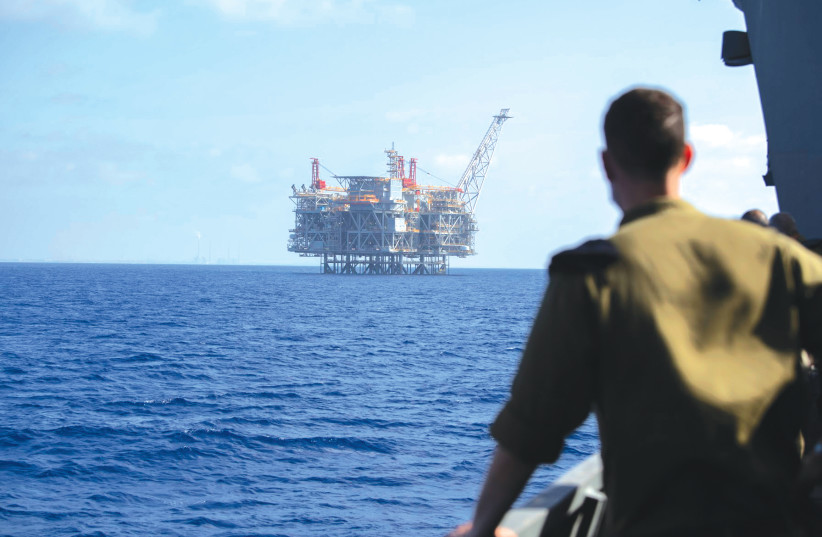Israel and water: The Zionist dreams and nightmares

A direct hit to Israel's Leviathan gas rig is nearly inevitable if there is an IDF attack on Iran’s nuclear facilities
Just as the combination of two hydrogen atoms with an oxygen atom to form water preceded the creation of heaven and earth in Genesis, so too Zionist dreams preceded the creation of the State of Israel. Theodor Herzl, in making his last great literary splash with the publication of his novel Altneuland, envisioned taking advantage of the world-leading drop in height from the Mediterranean Sea to the Dead Sea. Herzl’s vision was that all of Israel’s energy would be supplied by a massive, roaring hydroelectric plant modeled on Niagara Falls, and it would produce enough energy to share with our neighbors in the interest of promoting peaceful relations. Many Zionist dreams are transboundary, mostly due to the precarious position of the Hashemite Kingdom of Jordan, which is the 10th-driest country on the planet, with which we share a water border – the river previously known as the mighty Jordan.
The Jordan River was once so mighty that in 1920 Pinchas Rutenberg, the founding father of what later became the Israel Electric Company, submitted to the British a plan to build more than a dozen hydroelectric plants on the river. A year later, he received a concession granting him all the water power rights to the Jordan and to build the first station. The plant, which produced 18 MW, operated successfully for 16 years until it was ransacked by Iraqi forces on May 14, 1948.
However, Israeli control of the Sea of Galilee ensured that David Ben-Gurion could began work on the national water carrier, 130 kilometers of pipes and canals, and the national faucet for agriculture and drinking water was turned on in 1964 by prime minister Levi Eshkol. Today, Israel is producing so much desalinated water that we have fulfilled the miraculous equivalent of Psalm 114, “The Jordan reversed and flowed upstream,” with this year reversing the direction of the carrier flow back into the Kinneret.
Not all Zionist dreams were water-related. On the early maps of the State of Israel, there is a smaller body of water north of the Sea of Galilee – Lake Hula – which was drained by the early pioneers to eliminate malaria and make way for precious agricultural land.
Today, with Israel short on land and Jordan short on water, my friend Gideon Bromberg of EcoPeace floated a novel idea of the energy-water nexus, whereby Jordan would host large solar fields connected to Israel, and Israel would reciprocate with a desalination plant on the Mediterranean whose water would be streamed to Jordan. The idea stagnated under previous Netanyahu governments. But when the cold peace started to melt under the Bennett government, I cannot confirm or deny if this writer reached out to US climate envoy John Kerry to take the plunge and make the deal. A memorandum of understanding for the water-energy swap was signed by Israel, Jordan and the United Arab Emirates in 2021.
It is the kind of Zionist dream that former president Shimon Peres would have loved. When he served as minister for regional development over 30 years ago, Peres championed a canal from the Red Sea to the Dead Sea, which would benefit from the same drop in height as Herzl’s original idea. The program, embraced by Jordan but stalled by Israel, could restore the disappearing Dead Sea and provide enough power to desalinate water for Jordan and the Palestinians and provide Israel with additional water security. While there are some environmental issues to consider, it is a worthy dream that should be cultivated.
When Zionist water dreams become nightmares
The problem with dreams is that they can also become nightmares. There are shallow decisions Israel has made that are also an anti-Zionist’s dream. In the battle between Iran and Israel, Israel is in over its head. When Moshe Ya’alon was defense minister, he authorized that the Leviathan gas rig was going to be 125 km. out to sea. This way, should there be an accident, a regional earthquake or a missile attack – tfu, tfu, tfu – the cancerous condensate and other poisons that would spill out wouldn’t seep into our desalination plants. By Prime Minister Binyamin Netanyahu’s moving Leviathan into spitting distance of Israel’s shore, and now within reach of Iran-supplied Hezbollah missiles, a direct hit to the gas rig is nearly inevitable if there is an attack on Iran’s nuclear facilities. Such a hit would not only require Israel to shut down all the desalination plants – nearly all our drinking water – but the immediate electricity outage means that Israel’s pumped water system would be, like our thirsty people, powerless. Israel has an incredible water legacy that is the envy of the world; but it could all go down the proverbial drain if left untreated. ■
Yosef Israel Abramowitz is a leading climate activist and impact investor and serves as CEO of Energiya Global. He was nominated by MK Alon Tal for the 2023 Nobel Peace Prize, is a leader of President Herzog’s Climate Forum, and can be followed @ KaptainSunshine.
Jerusalem Post Store
`; document.getElementById("linkPremium").innerHTML = cont; var divWithLink = document.getElementById("premium-link"); if (divWithLink !== null && divWithLink !== 'undefined') { divWithLink.style.border = "solid 1px #cb0f3e"; divWithLink.style.textAlign = "center"; divWithLink.style.marginBottom = "15px"; divWithLink.style.marginTop = "15px"; divWithLink.style.width = "100%"; divWithLink.style.backgroundColor = "#122952"; divWithLink.style.color = "#ffffff"; divWithLink.style.lineHeight = "1.5"; } } (function (v, i) { });


